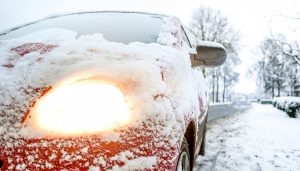Your Engine is Flooded
Every winter driver believes they have a magic trick to starting a vehicle when it is extremely cold out, even when the engine block heater hasn’t been plugged in. And virtually every winter driver experiences the fallible, humiliating moment where they realize they aren’t a car whisperer. Starting a car’s engine in very cold temperatures doesn’t cause damage however. It’s the other effects that can be problematic. If the battery is a little too weak to crank the engine over quickly, if you stomp the gas pedal too much (on carbureted engines), or if your ignition spark isn’t strong enough to ignite the cold fuel easily, you can effortlessly flood the engine. This happens when more fuel is introduced into the cylinders than can be burnt, and the spark plugs are actually wetted with gasoline. Fuel seeps down into the crankcase and contaminates your engine oil, so you will likely need to replace the spark plugs and get a fresh oil change.
Your Battery is Too Weak
This is the most common winter problem you can experience. Every parking lot during a cold snap features at least one freezing driver standing outside their car, their battery tied to another vehicle with booster cables like it is on life support. It’s such a simple system that all-too-often goes neglected until there is a problem. Whether there is an internal fault such as a bad battery cell, or if the battery just won’t hold a full charge anymore due to its age, your battery should be checked before the throes of winter to make sure it won’t cause you problems. A dead battery can occur in the worst times when help is not available, and you may be in potentially big trouble.
Your Windshield Washer Fluid is Frozen
All summer long, bug wash is readily available for windshield washer fluid with detergents that help dissolve those sticky, hard to remove bug guts from your windshield. It does a great job – until a cold snap. If you are left with a washer fluid reservoir full of bug wash when sub-zero temperatures hit, you’re in for a surprise. You may not think anything of it until then, but slushy, snowy, icy weather requires a dissolving washer fluid with antifreeze capacities. When ice and slush build up on your windshield, smearing it around with the wiper blades is never enough. You need the antifreeze spraying on it to break it up and to clean off your wiper blades. Not only will bug wash freeze solid in the reservoir, but it can quite readily crack the reservoir, washer hoses, and nozzles (water expands when it freezes, remember). That means a repair bill along with a purchasing a jug of winter-friendly washer fluid.








